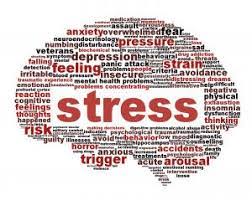Beau Productions Historical Website

 |
STRESS -- What It Is, How to Treat It  Stress is a feeling of emotional or physical tension. It can come from any event or thought that makes you feel frustrated, angry, or nervous. Stress is your body's reaction to a challenge or demand. In short bursts, stress can be positive, such as when it helps you avoid danger or meet a deadline. What happens to the body during stress? The body's autonomic nervous system controls your heart rate, breathing, vision changes and more. Its built in stress response, the fight or flight response, helps the body face stressful situations. When a person has long-term (chronic) stress, continued activation of the stress response causes wear and tear on the body. Physical, emotional and behavioral symptoms develop. Physical symptoms of stress include: Aches and pains. Chest pain or a feeling like your heart is racing. Exhaustion or trouble sleeping. Headaches, dizziness or shaking. High blood pressure. Muscle tension or jaw clenching. Stomach or digestive problems. Trouble having sex. Weak immune system. Stress can lead to emotional and mental symptoms like: Anxiety or irritability. Depression. Panic attacks. Sadness. Often, people with chronic stress try to manage it with unhealthy behaviors, including: Drinking alcohol too much or too often. Gambling. Overeating or developing an eating disorder. Participating compulsively in sex, shopping or internet browsing. Smoking. Using drugs. Keeping stress at bay is crucial to your health, but you might think it's easier said than done. That's why we're sharing five easy tips anyone can implement this month and every month to manage stress and feel better inside and out! When should I talk to a doctor about stress? You should seek medical attention if you feel overwhelmed, if you are using drugs or alcohol to cope, or if you have thoughts about hurting yourself. Your primary care provider can help by offering advice, prescribing medicine or referring you to a therapist. It's natural and normal to be stressed sometimes. But long term stress can cause physical symptoms, emotional symptoms and unhealthy behaviors. Try relieving and managing stress using a few simple strategies. But if you feel overwhelmed, talk to your doctor. THE CONTENTS OF THIS WEBSITE AND THE LINKS ARE FOR INFORMATION ONLY AND ARE NOT A SUBSTITUTE FOR PROFESSIONAL MEDICAL ADVICE. More Articles coming soon |

hit counter html
